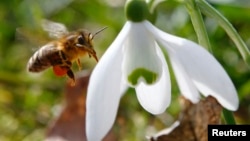Insects that pollinate flowers and crops face an increasingly complex - and distracting - world of smells.
Their olfactory receptors are activated by all scents - the natural smell of blossoms and grasses, as well as man-made ones, such as fumes from car and truck engines. Researchers at the University of Washington and University of Arizona say those background odors can mask floral scents. As a consequence, insects spend more time and energy looking for flowers.
Using advanced instruments, the researchers found that background odors significantly influenced how a moth called Manduca sexta detected flower scents, both in nature and in laboratory settings. Writing in the journal Science, they report the moths, which can detect odors about as well as dogs can, were easily misled by non-floral scents.
The scientists now plan to look at honeybees to see whether emissions from cities affect pollination at surrounding farms.




